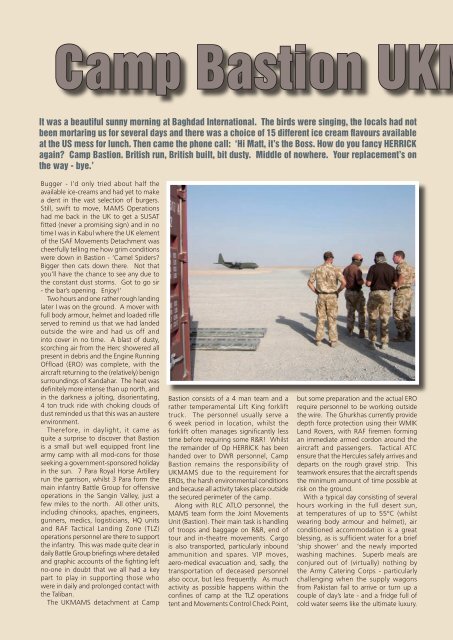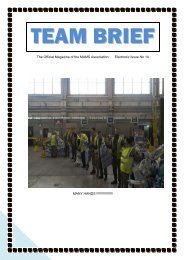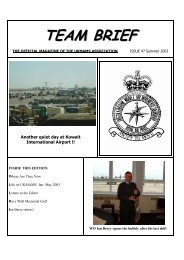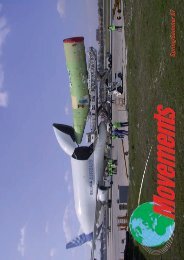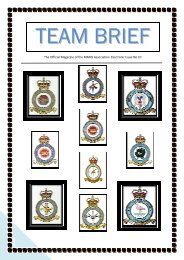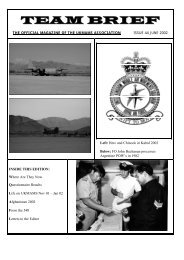Movements
Movements
Movements
You also want an ePaper? Increase the reach of your titles
YUMPU automatically turns print PDFs into web optimized ePapers that Google loves.
Camp Bastion UKM<br />
It was a beautiful sunny morning at Baghdad International. The birds were singing, the locals had not<br />
been mortaring us for several days and there was a choice of 15 different ice cream flavours available<br />
at the US mess for lunch. Then came the phone call: ‘Hi Matt, it’s the Boss. How do you fancy HERRICK<br />
again? Camp Bastion. British run, British built, bit dusty. Middle of nowhere. Your replacement’s on<br />
the way - bye.’<br />
Bugger - I’d only tried about half the<br />
available ice-creams and had yet to make<br />
a dent in the vast selection of burgers.<br />
Still, swift to move, MAMS Operations<br />
had me back in the UK to get a SUSAT<br />
fitted (never a promising sign) and in no<br />
time I was in Kabul where the UK element<br />
of the ISAF <strong>Movements</strong> Detachment was<br />
cheerfully telling me how grim conditions<br />
were down in Bastion - ‘Camel Spiders?<br />
Bigger then cats down there. Not that<br />
you’ll have the chance to see any due to<br />
the constant dust storms. Got to go sir<br />
- the bar’s opening. Enjoy!’<br />
Two hours and one rather rough landing<br />
later I was on the ground. A mover with<br />
full body armour, helmet and loaded rifle<br />
served to remind us that we had landed<br />
outside the wire and had us off and<br />
into cover in no time. A blast of dusty,<br />
scorching air from the Herc showered all<br />
present in debris and the Engine Running<br />
Offload (ERO) was complete, with the<br />
aircraft returning to the (relatively) benign<br />
surroundings of Kandahar. The heat was<br />
definitely more intense than up north, and<br />
in the darkness a jolting, disorientating,<br />
4 ton truck ride with choking clouds of<br />
dust reminded us that this was an austere<br />
environment.<br />
Therefore, in daylight, it came as<br />
quite a surprise to discover that Bastion<br />
is a small but well equipped front line<br />
army camp with all mod-cons for those<br />
seeking a government-sponsored holiday<br />
in the sun. 7 Para Royal Horse Artillery<br />
run the garrison, whilst 3 Para form the<br />
main infantry Battle Group for offensive<br />
operations in the Sangin Valley, just a<br />
few miles to the north. All other units,<br />
including chinooks, apaches, engineers,<br />
gunners, medics, logisticians, HQ units<br />
and RAF Tactical Landing Zone (TLZ)<br />
operations personnel are there to support<br />
the infantry. This was made quite clear in<br />
daily Battle Group briefings where detailed<br />
and graphic accounts of the fighting left<br />
no-one in doubt that we all had a key<br />
part to play in supporting those who<br />
were in daily and prolonged contact with<br />
the Taliban.<br />
The UKMAMS detachment at Camp<br />
22 <strong>Movements</strong><br />
Bastion consists of a 4 man team and a<br />
rather temperamental Lift King forklift<br />
truck. The personnel usually serve a<br />
6 week period in location, whilst the<br />
forklift often manages significantly less<br />
time before requiring some R&R! Whilst<br />
the remainder of Op HERRICK has been<br />
handed over to DWR personnel, Camp<br />
Bastion remains the responsibility of<br />
UKMAMS due to the requirement for<br />
EROs, the harsh environmental conditions<br />
and because all activity takes place outside<br />
the secured perimeter of the camp.<br />
Along with RLC ATLO personnel, the<br />
MAMS team form the Joint <strong>Movements</strong><br />
Unit (Bastion). Their main task is handling<br />
of troops and baggage on R&R, end of<br />
tour and in-theatre movements. Cargo<br />
is also transported, particularly inbound<br />
ammunition and spares. VIP moves,<br />
aero-medical evacuation and, sadly, the<br />
transportation of deceased personnel<br />
also occur, but less frequently. As much<br />
activity as possible happens within the<br />
confines of camp at the TLZ operations<br />
tent and <strong>Movements</strong> Control Check Point,<br />
but some preparation and the actual ERO<br />
require personnel to be working outside<br />
the wire. The Ghurkhas currently provide<br />
depth force protection using their WMIK<br />
Land Rovers, with RAF firemen forming<br />
an immediate armed cordon around the<br />
aircraft and passengers. Tactical ATC<br />
ensure that the Hercules safely arrives and<br />
departs on the rough gravel strip. This<br />
teamwork ensures that the aircraft spends<br />
the minimum amount of time possible at<br />
risk on the ground.<br />
With a typical day consisting of several<br />
hours working in the full desert sun,<br />
at temperatures of up to 55ºC (whilst<br />
wearing body armour and helmet), air<br />
conditioned accommodation is a great<br />
blessing, as is sufficient water for a brief<br />
‘ship shower’ and the newly imported<br />
washing machines. Superb meals are<br />
conjured out of (virtually) nothing by<br />
the Army Catering Corps - particularly<br />
challenging when the supply wagons<br />
from Pakistan fail to arrive or turn up a<br />
couple of day’s late - and a fridge full of<br />
cold water seems like the ultimate luxury.


